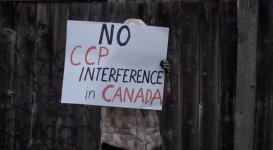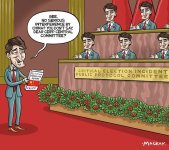China’s Influence in Canada Worse Than Expected

A protester holds a sign that reads "No CCP interference in Canada" at a rally outside of the Wenzhou Friendship Society in Richmond, B.C., on Feb. 25, 2023. (Vivian Yu/NTD)
By Anders Corr
March 21, 2023
Commentary
Canada is in an uproar. On Saturday, the New York Times called Canadian concerns about China’s election interference a “political firestorm.”
The storm is from intelligence leaked to multiple Canadian reporters and authors over the past few years from Canadian security sources. The intelligence indicates that China allegedly sought to keep Prime Minister Justin Trudeau and his Liberal Party in power over the last two elections, albeit in a weak position as a “minority government” dependent on a third party’s support.
Apparently, China’s communists see Trudeau as soft on the party, but they don’t trust him further than they can throw him.
The goal of the Chinese Communist Party (CCP) with respect to Canada, according to experts interviewed by the National Post, a Canadian paper, is “trying to keep Canada quiet about China’s human rights abuses, disrupting Canada’s relationships with its intelligence partners and finding ways to steal technology and trade secrets.”
Information from the sources is evidence that Chinese consulates in Canada, or those linked to the regime in Beijing, have allegedly invested in tech companies with sensitive technology, donated a million dollars to Trudeau’s family foundation, made illegal cash transfers to Liberal Party campaigns, and volunteered Chinese nationals to work illegally for campaigns. The CCP has used gangs to intimidate Chinese dissidents, launder money, and traffic in illegal drugs, according to the sources, which include documentary evidence.
All of that—as shocking as it still is—was known previously.
US Intelligence Probed Canada
New reporting from the Canadian Broadcasting Corporation (CBC) indicates that U.S. intelligence agencies have long been worried about China’s influence in Canada, to the point of conducting a “secret probe” up North of the border as far back as the 1990s.
The probe, called Operation Dragon Lord, is covered in a new book by former Royal Canadian Mounted Police (RCMP) intelligence official Scott McGregor and film-maker Ina Mitchell. (Full disclosure: the publisher of the book, Optimum Publishing International, published one of mine as well.)
From 2014 to 2018, McGregor served in the RCMP as an intelligence adviser whose duties included combating organized crime. Previously, he spent 22 years in military intelligence.
CBC reporter Alexander Panetta found sources to corroborate key information in the book, titled “The Mosaic Effect: How the Chinese Communist Party Started a Hybrid War in America’s Backyard.”
National Broadcaster Confirms Allegations
The book and CBC cite a 1998 U.S. Department of Justice memo completed in coordination with other U.S. intelligence agencies, including the Central Intelligence Agency, Federal Bureau of Investigation, and the Defense Intelligence Agency.
While CBC did not fully authenticate the memo, it corroborated concerns in it with both Canadian and U.S. intelligence officials from the time. The memo was broadly concerned with an alleged alliance between the CCP and Chinese gangs called triads. CCP-supported gang activity, according to the report, principally emanated from Canada.
“Canada was aware of these threats for 25 years and has allowed them to manifest,” McGregor told the CBC.
The CBC interviewed a former Canadian Security and Intelligence Service (CSIS) Asia-Pacific Bureau chief, Michel Juneau-Katsuya, who supports the key findings of the book authors. Juneau-Katsuya said that since the 1980s, each Canadian government would be implicated by a full public inquiry of connections between Canadian officials and China’s United Front Work Department.
Juneau-Katsuya declined to provide further evidence as to the claim during a CBC Newsroom interview on Sunday, but doubled down by saying that every prime minister was compromised by China since Brian Mulroney, who served from 1984 to 1993.
“Every prime minister has been compromised at one point or another by those agents of influence,” Juneau-Katsuya told a CBC news anchor. “It is a phenomenal security risk because basically you can ask yourself the question, who is really running the country? Is it a foreign entity, or is it our government?”
Juneau-Katsuya said that evidence about the prime ministers existed. He believes it should be made available to an independent public inquiry, not to find guilt in the past, but to develop better procedures to protect Canada so that “future governments will not fall into the same groove.”
Juneau-Katsuya was the lead author of Canada’s 1997 Sidewinder Report, which made many of the same conclusions as the 1998 U.S. memo. A leaked draft of Sidewinder alleged far-reaching spying and criminality by an alliance of China’s regime and triad gangs. The Canadian government reportedly sanitized much of the draft report.
Juneau-Katsuya will serve as a witness before a Canadian parliamentary committee on the country’s China relations in the coming days, according to the CBC.
US Frustrated in 2015
I’m not surprised by news of the probe. In about 2015, I heard from a knowledgeable source that U.S. intelligence was upset that China used permissive conditions in Canada to infiltrate spies into the United States. When U.S. intelligence complained, Canada did little, according to the source.
While living in New York at the time, I befriended a relatively powerful Chinese-Canadian who worked at an important institution. U.S. authorities warned me off of him, saying he was “dangerous” and implying that he actually worked for China. They couldn’t do anything about him, they lamented, because he was a Canadian citizen.
Clearly, the U.S.–Canada alliance was failing in that moment, failed before, and failed after, when it came to something as important as China’s election interference, spying, and I might add, industrial espionage and intellectual property theft of as much as $600 billion annually in the United States alone.
The United States and Canada desperately need a national discussion and legal reforms to protect against obvious issues of CCP attempts to interfere in our elections and influence our leading politicians.
One of the national security officials who leaked intelligence about China’s election interference wrote an anonymous opinion article published on Friday. In it can be found a piece of profound wisdom.
The author wrote of hoping his or her leak would “launch a conversation about how to improve transparency, how to enhance accountability, how to protect all members of our society against external threats, and ultimately, about how we continue to pursue a system of governance that best serves all of its citizens.”
Current Affairs Canada Audio Podcast
Current Affairs Canada PDF Feed


